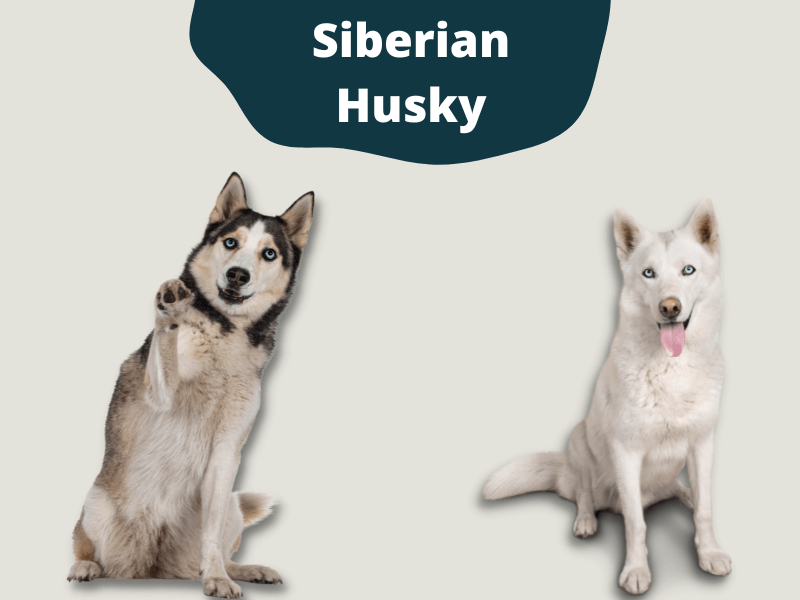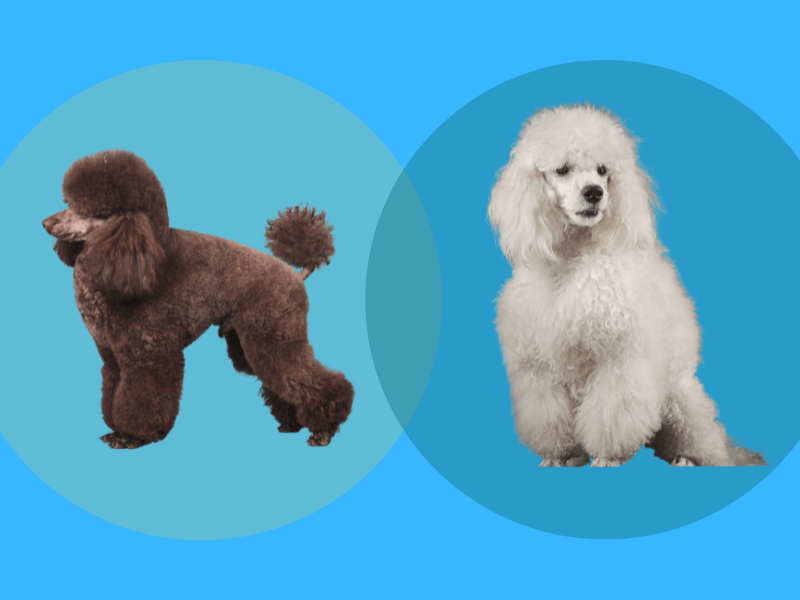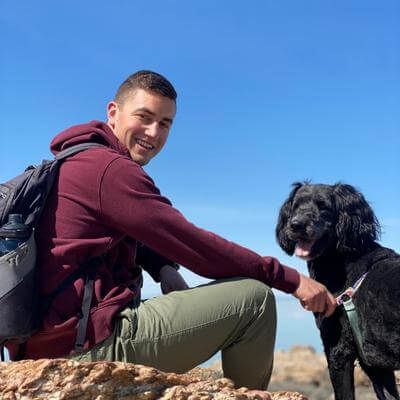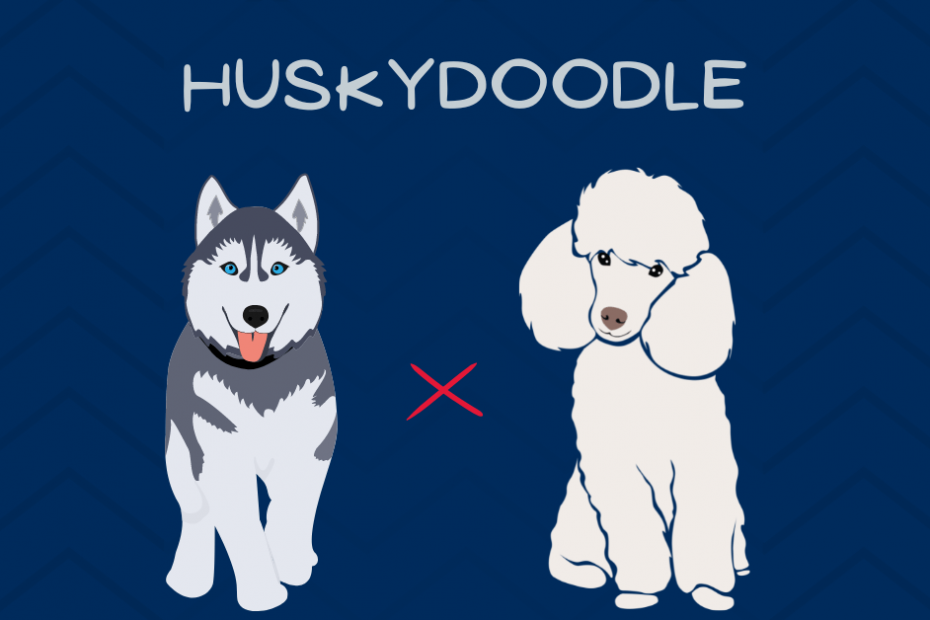What do you get when you cross a purebred Siberian Husky with a purebred Poodle? You get a lovable, energetic, intelligent, and very playful pooch known as the Huskydoodle.
Read on to learn more about this delightful designer breed. This article will discuss the many aspects and exciting facts of the adorable Siberian Husky-Poodle mix.
What is a Huskydoodle?
A Huskydoodle is a designer breed dog crossed between a pure-bred Siberian Husky and a Standard Poodle. A Husky can also be crossed with a Miniature Poodle to get a Mini Huskydoodle.
Since it is a Poodle mix, the breed is classified as a Doodle breed.
This designer breed is affectionately known as Siberpoo, Poosky, Siberian Poodle, and Huskypoo.
Huskydoodles are highly intelligent and alert, very active and playful, and can be pretty stubborn at times. They are affectionate, loyal, friendly with other dogs and people, and good with older children.
Breed Popularity
Huskydoodles are a relatively new designer dog breed, and not much is known about their popularity. However, although difficult to find, breeders do have puppies for sale, which says something about their popularity.
Another plus for this adorable pup is that both parents are among the top 20 dog breeds in the US [1]www.akc.org/expert-advice/dog-breeds/the-most-popular-dog-breeds-of-2020/.
Designer breeds are becoming more popular to own, and many new breeders are entering the market for the first time. With these new developments, Huskydoodles should see increased popularity and availability.
As long as there are Siberian Husky and Poodle breeds, the Huskydoodle can continue to be bred as a designer dog.
History of Huskydoodles
Designer dog breeders started breeding this crossbreed in the 1990s.
Where and when the first Huskydoodle was born is not known. But they most likely originated from North America as the first Siberian Husky breed arrived here in 1908.
Both parent breeds have a rich history that stretches back a few thousand years.
Siberian Husky

The Siberian Husky has an origin story that is thousands of years old. The Chukchi Indians from the Soviet Arctic region needed a dog to haul goods in extreme temperatures [2]www.ukcdogs.com/siberian-husky.
The grueling cold temperatures and job requirements helped forge the breed into a hardy dog with incredible endurance. The Husky was later introduced to Alaska, where they were used as sled dogs.
Huskies have a strong work ethic, but they also are hysterical. The video below shows how this breed really has a sense of humor, which is a great quality to pass onto Huskydoodles!
[lyte id=’1yEi1G4JSMI’ /]
Poodle

Poodles originated in Germany about 300 years ago. They were bred as waterfowl retrievers. Their iconic haircuts were styled so that they would be agile in the field and protect sensitive organs in cold water.
Their intelligence and cute looks helped them transition into homes all across Europe. They were adopted as France’s national dog. They even spent some time as circus dogs before they were brought over to the United States.
Why the Poodle Was Mixed with a Husky
The aim of producing the Huskydoodle was to combine the intelligence and low-shedding traits of the Poodle with the hardworking Siberian Husky.
Designer breeds are fast becoming more sought after by owners who prefer dogs that have been specially crossbred to bring out the best of both of their parent lineage.
Appearance
Huskydoodles, being a hybrid breed, will typically take on the appearance of the parent gene, which is the most dominant. Not all Huskypoos look alike, but their general appearance is described below.
The Coat Of A Huskydoodle
The Husky Poodle mix mostly takes on the coloring of the Husky parent, which is black, gray, and white. However, some might have a dash of brown, apricot, red, or cream from their Poodle ancestry.
The coat is usually a double coat like the Husky, a soft undercoat with a long-haired topcoat. The fur could be straight or curly like the Poodle. Huskypoos do shed some hair year-round and, if they take after the Husky parent, will blow out their hair when the seasons change.
Like most Doodle breeds, the Huskydoodle will likely have wavy or curly hair due to the Poodle’s genetics.
Face
A Huskypoo has the cutest face you can easily fall in love with! The look is like a Poodle, with shaggy hair around the whole face, adorable floppy ears, and a black nose.
The eyes are piercing and intelligent and could either be the striking ice blue eyes of the Siberian Husky or dark like the Poodle. Huskypoos can have, on rare occasions, intriguing multi-colored eyes, one blue and one dark.
Body
The build of the Siberpoo is a medium to large size and muscular, like the Siberian Husky. Large dogs will have muscular, solid legs, while the smaller dogs will have less muscle and stumpy legs.
The tail can either be straight or have the curl of the Husky.
How big do Huskydoodles get?
Huskypoos come in different sizes, depending on whether the parent was a Miniature Poodle or a standard size. Below are the generally estimated sizes of the Mini and Standard Huskydoodles and their parent breed sizes.
| Mini Huskydoodle (Adult) | Standard Huskydoodle (Adult) | |
| Height | 12-20 inches | 20-25 inches |
| Weight | 15-35 pounds | 35-60 pounds |
Note: The height is measured from its withers (the highest part of the shoulder blades).
Huskydoodles will experience their fastest growth spurt in the first six months. Their growth will then slow down until they reach their full-grown weight at around 1.5 years.
They will grow in height until they plateau at 10 to 12 months. Your pup’s breeder will be able to tell you more about the stature of its parents.
What are Huskydoodles like?

Temperament Of Huskydoodles
Huskydoodles inherit a mix of the best traits from both parent breeds. They are loyal like the Poodle and faithful companions like the Siberian Husky.
They don’t have a lot of patience with younger children who might occasionally pull on the ears or tail. Be wary of this when babies and toddlers are around your Siberpoo.
Huskydoodles like being around people and are friendly with a pack mentality, so having other dogs in the home should be no problem. They could chase cats and other small animals like hamsters or rabbits, bringing out the Poodle side of their hunting gene.
But this situation can be addressed if they have been introduced to these pets from the puppy stage. They can learn to be tolerant with proper training and socialization.
Energy Levels
A Huskypoo has boundless energy and, like an excited child, will be ready to run, jump and play whenever you are!
These active dogs inherit their high stamina from the Siberian Husky parent, who was bred as a sled dog, so being active is in the genes. The Poodle parent was bred for retrieving waterfowl for hunters.
So, with all this inherited energy, Huskydoodle puppies will need lots of playing around in the backyard with the family. As soon as they can walk on the leash, a daily walk excursion will allow this little one to run off some energy.
Older dogs can be part of more high-impact activities, such as joining you on your daily run or running next to you when cycling. Huskypoos will even join you for some exercise in the swimming pool.
If your family enjoys hiking, take your Huskydoodle with you. Their playful demeanor will have them skirting around the trails and socializing as they go. With their high stamina and energy level, they will be well suited to this form of exercise.
Puppies and older dogs will become bored and get up to mischief if they are not offered some form of mental stimulation. They can have annoying tendencies such as digging up your garden or chewing on your slippers and other items in the house.
Daily exercise, with mental stimulation, is the best way to keep your Huskydoodle happy and content to avoid these encounters.
Health
Your Poosky will be prone to the same diseases and health problems as the Siberian Husky and the Poodle. However, most Huskydoodles are generally healthy and can live between 10 to 14 years.
Fortunately, as a hybrid dog their risk of inheriting breed-specific diseases is decreased.
During their lifetime, they could develop the following common health issues:
- Allergies and skin issues can be caused by the double coat inherited by the Husky parent.
- Patellar luxation is a kneecap condition of the Siberian Husky.
- Bloat, this tendency is from the Poodle gene.
- Hip dysplasia causes the thigh bone to not fit the hip joint resulting in discomfort in the legs. This can lead to arthritis in old age. Ask the breeder when you purchase a puppy if the pup has been tested for hip dysplasia.
- Cataracts causing poor vision can occur in senior dogs.
Feed your dog balanced meals, watch their weight, keep them well-groomed and give them daily exercise to keep active and healthy.
How much does a Huskydoodle cost?
Be prepared to pay between $450 to $1500 for a Huskydoodle puppy [3]www.greenfieldpuppies.com/huskipoo-puppies-for-sale/. This price will vary from breeder to breeder.
Buying your Huskypoo from a reputable breeder should be your first option. Finding out more about these breeders is recommended so that you can be assured of purchasing a strong and healthy pup [4]thehappypuppysite.com/puppy-search-12-finding-a-breeder/.
Or you could adopt an older Huskydoodle from a dog or rescue shelter.
How to Care for a Huskydoodle
Huskydoodles may require some pampering in the form of daily grooming and will need lots of love and attention. But this charming dog is worth the extra effort and high maintenance, and it’s not too difficult to keep them well-fed, amused, and healthy.
Feeding
Serve your Huskydoodle quality dog food specifically formulated for a medium to large dog with high energy. Limited carbohydrates for maintaining an ideal weight, high protein for healthy muscles, plus a good dose of Vitamin A and Omega fatty acids should form part of their daily diet.
Your pets’ dietary needs will change from the puppy stage to a full-grown adult and then change again as the dog reaches its senior years. Be sure to read the recommended feeding guide on the food package or consult your veterinarian for the best dietary advice for your Huskypoo.
Grooming A Huskydoodle
Your Siberpoo’s coat will need regular brushing a few times a week, and an occasional bath will be required when the coat is dirty. Don’t wash the fur too frequently, as this will dry out your canine’s hair.
Should your Huskydoodle inherit the Poodle’s long hair, a good brushing is required daily. A visit to the professional groomer every 4 to 6 weeks is essential for keeping the coat well-groomed.
Huskypoos are prone to skin allergies, so check the skin for any signs of redness during brushing sessions. They will also have excessive scratching and nibbling at their fur [5]dogtime.com/dog-breeds/huskydoodle#:~:text=Coat%20Color%20And%20Grooming,although%20this%20is%20less%20common..
If this occurs, your pup could be allergic to something in the home. Should you be concerned in any way, speak to your veterinarian for expert advice.
The dog’s nails should be trimmed at least once a month, more if the nails grow quickly. Inspect your Siberpoo’s ears every week for any signs of infection and clean them when necessary.
Brushing your puppy’s teeth every day with enzyme toothpaste is essential and will keep teeth and gums healthy.
Huskypoo Fun Facts
Here are some fun facts about Huskypoos:
- They enjoy spending time with their family, love attention, and can become quite demanding and clingy at times.
- Huskypoos bark and growl as a means of communication and will be alert as a house watchdog. Still, they are not aggressive and are by no means typical guard dogs.
- Huskydoodles will howl just like Siberian Huskies. It can be unnerving at times, but it’s just to get your attention!
- Although very energetic and playful, your Siberpoo will also love to climb up next to you on the couch for some special cuddle time.
- You can register your Huskydoodle with the American Canine Hybrid Club [6]ACHC.
FAQs
Below are a few frequently asked questions about Husky-Poodle mixes.
Are Huskydoodles good with Kids?
Yes, Huskydoodles are great with kids. They are playful, watchful, and sweet-natured.
However, it is always a good idea to keep an eye on your pup when first introducing him to young children. Sometimes they get excited and will want to jump or play too hard around small children.
Are Husky Poodles hypoallergenic?
Yes, the Husky-Poodle mix is hypoallergenic. They are a great choice if your or a family member suffers from allergies due to pet dander. A win for allergy sufferers!
Can I Keep A Huskydoodle In An Apartment?
Huskypoos will do well in apartments if they are exercised daily. Take them for a walk or let them go jogging with you to get their energy out!
They will also love a romp in the dog park and the chance to socialize with other dogs.
Do Huskypoos Like To Swim?
Swimming is a great endurance exercise for a Huskydoodle. Their Poodle-parent is a natural swimmer.
Swimming is great to satisfy high energy levels especially during hot summer weather. Start by teaching your Siberpoo with a lifejacket to keep them safe!
Can I Take A Huskydoodle Cycling?
Huskydoodles adapt well to an active lifestyle. They would love to run beside you as you cycle.
Be sure to keep to a comfortable pace for your pooch and to avoid any extremely high temperature days.
Conclusion
The Huskydoodle is a designer breed dog produced by crossbreeding a Siberian Husky with a Poodle. This pooch is lovable, loyal, energetic, intelligent, and playful.
After writing this article, I am a total Huskydoodle lover! If you’re interested in other Poodle-mixes, you should read my comprehensive guide to Doodle dog breeds.
Related Posts
- What do you get when you cross a Goldendoodle with a Husky? A Golden Huskydoodle!

References

